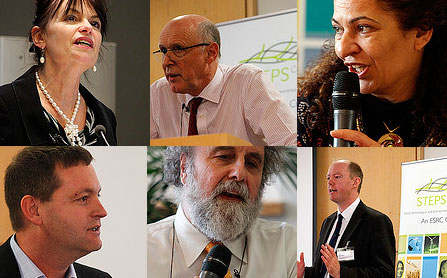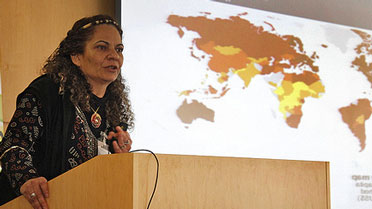Our symposium on the global politics of scientific advice was held on 6-7 February at the University of Sussex. Video, slides, comment and other resources are now available to view.
Video | Presentations | Resources | Photos | Storify | Blog

-
STEPS Symposium Programme (pdf, 735kb)
Credibility Across Cultures: expertise, uncertainty and the global politics of scientific advice
Overview
Worldwide, we see novel structures for scientific advice being put in place: both through new institutions like the Intergovernmental Science-Policy Platform on Biodiversity and Ecosystem Services (IPBES); and the appointment of a UK-style ‘chief scientific adviser’ at the European Commission. These issues were also magnified in the run-up to the Rio+20 Earth Summit and in debates over what should succeed the Millennium Development Goals. Following Rio+20 in June 2012, there has also been a renewed push to ensure that the latest research and evidence informs international policy discussions, with new initiatives such as Future Earth and the UNESCO science advisory board.
Tackling the sustainability and development challenges of the 21st century will undoubtedly require the ‘best available’ scientific advice: to measure progress; to predict impacts; to identify solutions; and to evaluate options and pathways for decision-making.
But what is ‘best advice’ – and how might this idea need to be re-thought – amidst the inherent complexities, uncertainties and contestations of knowledge and value that pervade so many of today’s challenges? Many questions persist about how to build and maintain robust, open and accountable processes of expert advice that can operate effectively across disciplines, sectors, social contexts and national boundaries.
This critical task – of maintaining credibility across cultures – was the focus of the 2013 STEPS Centre Annual Symposium.
List of speakers: (View the videos and slides)
-
-
- Dr Alice Bell, Research Fellow and Head of Public Engagement, SPRU, University of Sussex
- Professor Lidia Brito, Director of Science Policy, United Nations Educational, Scientific and Cultural Organisation (UNESCO)
- Dr Robert Doubleday, Executive Director, Centre for Science and Policy (CSaP), University of Cambridge
- Professor Carl Folke, Scientific Director, Stockholm Resilience Centre
- Professor Anne Glover, Chief Scientific Advisor to the President, European Commission
- Professor Duncan Green, Senior Strategic Adviser, Oxfam UK
- Dr Dipak Gyawali, Pragya, Nepal Academy of Science and Technology
- Professor Mike Hulme, Professor of Climate Change, University of East Anglia
- Professor Alan Irwin, Dean of Research, Copenhagen Business School
- Dr Jan Marco Müller, Assistant to the Chief Scientific Adviser, European Commission
- Professor Susan Owens, Professor of Environment and Policy, University of Cambridge
- Dr Miles Parker, former Deputy CSA, Defra and Associate Fellow, Centre for Science and Policy, University of Cambridge
- Professor Roger Pielke, Professor of environmental studies at the Center for Science and Technology Policy Research, University of Colorado at Boulder
- Jill Rutter, Institute for Government
- Dr Suman Sahai, Convenor, GeneCampaign
- Professor David Spiegelhalter, Winton Professor of the Public Understanding of Risk, University of Cambridge
- Dr Camilla Toulmin, Director, International Institute for Environment and Development (IIED)
- Professor Sir Robert Watson, Former Chief Scientific Advisor, DEFRA
- Professor Chris Whitty, Director Research & Evidence and Chief Scientific Adviser, DFID
- Professor James Wilsdon, Professor of Science and Democracy, Sussex University
- Professor Brian Wynne, CESAGEN Professor, University of Lancaster
-
Future directions for scientific advice in Whitehall
This Symposium was part of a series of four events about ‘Future directions for scientific advice in Whitehall’, organised by The Institute for Government (IfG), The Alliance for Useful Evidence, The University of Cambridge Centre for Science and Policy (CSaP), SPRU, the ESRC
Read: A collection of essays based on the seminar series, to stimulate fresh thinking and practical recommendations on future directions in scientific advice in Whitehall, edited by Robert Doubleday and James Wilsdon
Available to DOWNLOAD HERE (CSaP website link)

Comments are closed.